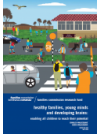This research report provides a critical overview of recent research into how minds and brains in young children develop, and some of its implications for families in New Zealand, highlighting the critical role of parents and caregivers in the physical development of children's brains.
It identifies factors that enable children to reach their full potential, or prevent them from doing so, as they interact with each other and with their parents and caregivers. The report also discusses the importance of pre-school years and the growing knowledge of the interaction between genetic endowment and experience in the development of a child’s mind and brain.
Key Results
The study concludes that while the neurodevelopment and cognitive development of most New Zealand children proceeds quite normally, there is likely to be a substantial minority of families where children are ‘at risk’ of impaired development. Recommendations included:
- Accessible information on the importance of healthy neural and cognitive development in children and the risks of developmental impairment be produced in popular formats, firstly aimed at a target group of families who are at risk of abusing or neglecting their children and the key groups that work with them, and secondly at the population as a whole.
- Access to high-quality ECE continues to be increased, particularly where children are at risk of violence, abuse or neglect.
- Policies that focus investment on lifting children and families out of poverty be extended to ensure adequate income, decent housing and affordable access to healthcare for all New Zealand families.
Further research be commissioned to track:
- the effects of impaired development in children so targeted policies can be implemented
- the numbers of children at risk
- the effectiveness of enhanced environments in restoring potential development for those whose development has been impaired
- the effectiveness of public education programmes in preventing children from becoming ‘at risk’ and promoting safe, secure and loving family and educational environments.

